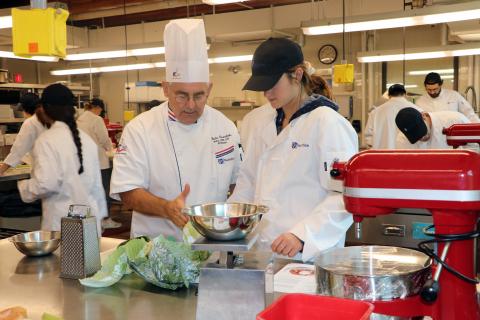
The UNH College of Life Sciences and Agriculture is now offering a culinary nutrition and food studies minor. Students in the minor learn foundational food preparation skills within the context of nutrition science and develop an understanding of the food environment and culture as it applies to human health.
The minor is designed to benefit students preparing for careers in allied health or health promotion, including dietitians, physicians, wellness coaches and nurses, and is designed to respond to the growing need for training in culinary nutrition. Dietitians, physicians, wellness coaches, nurses, and other health care providers with strong culinary skills will likely be better equipped to empower clients to choose and prepare healthier food choices.
“This is ideal for students who want to have skills in culinary arts and understand the role nutritious food plays in good health.”
“This is ideal for students who want to have skills in culinary arts, mainly basic food prep and some advanced food prep, and understand the role nutritious food plays in good health,” says Professor Charlie Caramihalis. “However, there are many other students on the periphery, like hospitality management. Maybe they want to be a chef, maybe they want to be a food and beverage director. Certainly, nutrition plays a part whether you’re in a hospital setting or in a restaurant setting. And being able to prepare basic healthy meals is just a great life skill for anyone.”
The new minor capitalizes on the expertise and resources that already exist in COLSA’s department of Agriculture, Nutrition and Food Systems, particularly in nutrition, culinary arts, and global agriculture, and supports the college’s mission to equip students with a profession-ready globally relevant education.
The curriculum includes hands-on learning in the full equipped professional kitchen on campus and the flexibility to incorporate study abroad coursework via the UNH in Italy program.
After dedicating his life to preparing and teaching others how to prepare food, Caramihalis is excited about adding this new dimension to the culinary curriculum.
“For culinary arts to merge with nutritional sciences to create a strong didactic as well as hands on curriculum is really a dream come true for those of us in food and nutrition at the university,” says Caramihalis. “The scientists, the culinary instructors, the research, it’s all right here. We have farms, we’re growing vegetables, we’ve got aquaculture, we raise animals and livestock, we’re composting, and now we’re filling in the missing pieces for our students in the farm-to-fork chain. I’m excited to see the minor grow and build it into what I know it can be.”